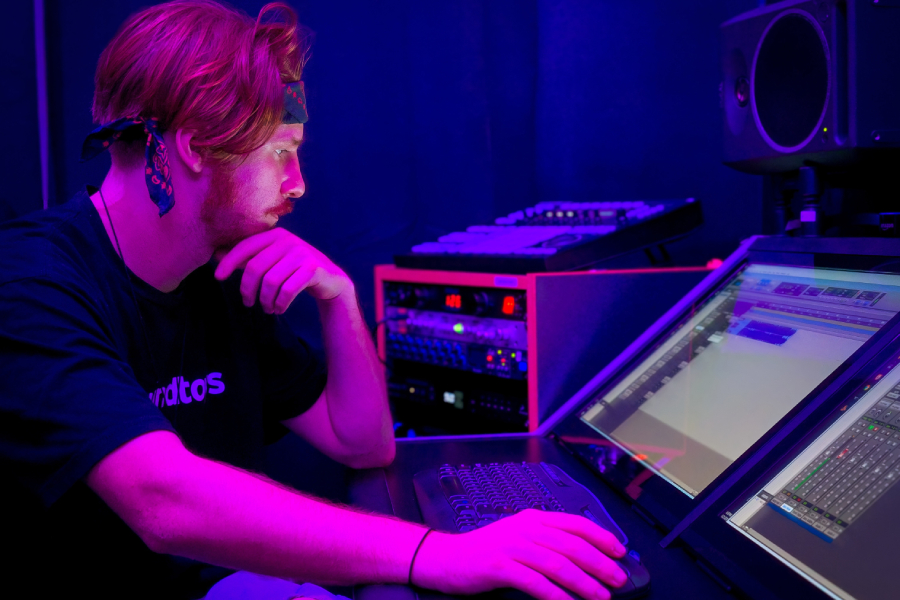
Over the past decade, it has become apparent that the music industry is constantly changing, requiring music professionals to be flexible and multifaceted.
Producers once discovered new talent by sifting through mixtapes artists sent in by mail or by attending local shows. But now, industry professionals can find their next breakthrough artist by browsing self-produced TikTok and trending YouTube videos from their beds.
Because of this shift, educational institutions need to focus on creating the next generation of music changemakers and leaders, those savvy in analytics, audience intelligence, entrepreneurship, and innovation.
The Creative School at Ryerson University launched Canada’s first-ever interdisciplinary undergraduate program in professional music, weaving together three essential elements that are shaping where the music business is going: studio production, live entertainment, and the business of music. This includes new ways to reach and engage audiences, identify and forecast trends, and cultivate leading digital marketing skills. It’s deeply connected to both the Canadian music world and the global industry.
The Creative School is a faculty that encompasses nine professional schools and three transdisciplinary hubs in media, design and cultural industries. The Professional Music program is its latest unique offering and reimagines the music industry for today’s diverse landscape and is open to everyone, not just musicians.
“Students should be musical but that can mean a lot of things,” says Dr. Steven Ehrlick, associate professor at the RTA School of Media and director of the Professional Music program. “You don’t necessarily have to perform or play an instrument. Students get a combination of academics and hands-on learning opportunities in the Professional Music program that they won’t be able to find anywhere else.”
The Creative School’s blend of academic depth and strong links to industry separates it from other art schools and recording programs. Distinct from traditional music degrees, the Professional Music program aims to nurture Canadian talent, helping them develop their authentic and creative voices. Through a wide-ranging curriculum, experienced instructors help students build the agile skills required for the modern music world.
“The industry is completely different from how it used to be. A&R coordinators no longer have to slog it out in clubs, it’s completely dominated by hip-hop and artists are able to record themselves in basement studios,” says Ehrlick. “So graduates from this program are going to be the professionals with the nimble set of tools to not only stay with the industry but also revolutionize the industry.”
Students enrolled in the Professional Music program will learn about digital and technical production, audio recording, distribution, commerce, contracts, audience engagement, and much more. They’ll also gain valuable insight into the burgeoning music industry in Canada, more specifically, in Toronto.
“The program is very connected to the City of Toronto as there’s an office that’s solely responsible for nurturing the city’s music scene,” says Ehrlick. “This is also the most central site of the music industry in Canada. In Toronto, we have the three major record labels and they even act as advisors to the program.”
Upon graduation, students will find themselves well-connected to the big players within the city’s music industry. The program prioritizes linking students to the diverse and inclusive music community as it’s plugged into a network that’s shaping where the music business is going.
“Music is not only an artistic commodity but, more importantly, it’s a public good,” says Salman Rana (YLook), a Toronto music lawyer and assistant professor who teaches in the Professional Music program.
He is also a member of Toronto’s hip-hop community and is a founding member of the artist collective, The Circle, along with artists Kardinal Offishall, Saukrates, and Jully Black. It’s largely credited with having globalized Toronto’s hip-hop sound throughout the 1990s and the first decade of the 2000s.
“Tomorrow’s music industry professionals will need to understand the disruptive and evolutionary nature of technology and the public policy questions that result from a rapidly changing environment that demands creative and practical business outcomes,” says Rana. “At The Creative School, a diverse and entrepreneurial student body will participate in future-forward thinking that places professional musicians and the creative economies they produce at the centre of their thinking.”
Carina Bianchini, a first-year student in the Professional Music program chose The Creative School over the other music and recording arts schools in Canada because it encompasses a variety of disciplines.
“The program stood out to me because it’s the first transdisciplinary undergraduate program for professional music in the country. It’s a cross between the RTA Media, Creative Industries, and the Performance Production & Design degree,” she says. “I’ve been performing for many years but there are lots of things that I’m learning in regards to other aspects of the industry. Personally, I consider myself an artist but in my class, I see many future producers, musical engineers, managers, booking agents, and more. I believe that we are the future of music.”
Learn more about the Creative School’s Professional Music program at ryerson.ca/music.












